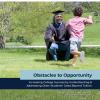0
Publication
Community:
Sep 5, 2023
Join the Housing Is Working Group for webinars, member updates, and round table discussions! This resource provides the 2023-2024 Calendar of Events.
Authored by: Housing Is
Topics: CLPHA, Education, Housing, Workforce development
 Shared by Camille Anoll-Hunter
Shared by Camille Anoll-Hunter
Camille Anoll-Hunter posted a
on Sep 5, 2023
Join the Housing Is Working Group for webinars, member updates, and round table discussions! This resource provides the 2023-2024 Calendar of Events.
0
Report
Community:
Jun 1, 2023
Every May, Ascend recognizes the importance of raising awareness about mental health and the multifaceted ways that it impacts family prosperity and well-being. Even as Mental Health Awareness Month comes to a close, we are committed every day to uplifting the drumbeat across our community that calls for an end to mental health stigma, making strides to ensure that families can access quality services, and advocating for policies that support families' unique mental health needs.
Join us in the national movement to raise awareness about mental health by exploring some of our new resources and sharing them with your community of changemakers!
Authored by: Ascend and the Jed Foundation for Ascend
Topics: Depression, Dual-generation, Education, Legislation & Policy, Mental health, Research
 Shared by Sandra Ware
Shared by Sandra Ware
Sandra Ware posted a
on Jun 1, 2023
Ascend and the Jed Foundation for Ascend
Every May, Ascend recognizes the importance of raising awareness about mental health and the multifaceted ways that it impacts family prosperity and well-being.
0
Report
Community:
May 1, 2023
During the 2022–2023 school year, there was a significant increase in the number of schools and districts participating in community eligibility, according to FRAC’s latest report, Community Eligibility: The Key to Hunger-Free Schools, School Year 2022–2023.
This report analyzes community eligibility adoption—nationally and for each state and the District of Columbia—in the 2022–2023 school year.
Authored by: Food Research & Action Center
Topics: Education, Food insecurity
 Shared by Camille Anoll-Hunter
Shared by Camille Anoll-Hunter
Camille Anoll-Hunter posted a
on May 24, 2023
Food Research & Action Center
During the 2022–2023 school year, there was a significant increase in the number of schools and districts participating in community eligibility, according to FRAC’s latest report, Community Eligibility: The Key to Hunger-Free Schools, School Year 2022–2023.
This report analyzes community eligibi
0
Report
Community:
May 17, 2023

The COVID-19 pandemic has upended life for children and families globally. The health, economic, educational and related stressors have contributed to mental health challenges for people of all ages, including our youngest and those who care for them.
In a new report, the Children's Equity Project, in partnership with the Buffett Early Childhood Institute at the University of Nebraska and Yale University, highlights the mental health of the early care and education workforce and the children they care for using data collected over the course of the pandemic in 2020 and 2021.
The report focuses on depression and elevated stress, including racialized stress in early educators, and provider reported increases in child externalizing, internalizing, and somatic symptoms. We provide national data as well as state profiles that highlight trends across state lines. We end with a set of recommendations for Congress, federal agencies, and states in prioritizing the mental health of children, families, and the early educators who care for them.
Authored by: Cinthia Palomino, PhD, Ayse Cobanoglu, PhD, Jennifer Oppenheim, PsyD, Evandra Catherinr, PhD, Shantel Meek, PhD, Walter Gilliam, PhD, Eric Bucher, EdD for Children's Equity Project
Topics: COVID-19, Early childhood, Education, Legislation & Policy, Low-income, Mental health, Racial inequalities
 Shared by Sandra Ware
Shared by Sandra Ware
Sandra Ware posted a
on May 17, 2023
Cinthia Palomino, PhD, Ayse Cobanoglu, PhD, Jennifer Oppenheim, PsyD, Evandra Catherinr, PhD, Shantel Meek, PhD, Walter Gilliam, PhD, Eric Bucher, EdD for Children's Equity Project
The COVID-19 pandemic has upended life for children and families globally.
0
Publication
Community:
Mar 2, 2023
Many students and families arrive in the U.S. from other countries without safe, stable housing, and experience homelessness and high mobility that can last for months. At SchoolHouse Connection, we recognize the crucial role that schools can play in providing stability and support to mitigate the disruption and trauma caused by homelessness. This page is dedicated to providing educators, policymakers, and advocates with valuable resources on how to best support these families and youth, and help ensure that all students have the opportunity to succeed in school and beyond.
Authored by: School House Connection
Topics: Early childhood, Education, Grade-level proficiency, Homelessness, Housing, Immigrants, Legislation & Policy, School-readiness, Youth
 Shared by Sandra Ware
Shared by Sandra Ware
Sandra Ware posted a
on Mar 14, 2023
Many students and families arrive in the U.S. from other countries without safe, stable housing, and experience homelessness and high mobility that can last for months.
0
Report
Community:
Mar 1, 2023
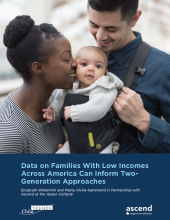
We are delighted to share a new research report in partnership with Child Trends: Data on Families with Low Incomes Across America Can Inform Two-Generation Approaches. In this new analysis, research experts Elizabeth Wildsmith and Marta Alvira-Hammond paint a detailed picture of how families in households with low incomes in the United States have changed since 2011. The report highlights 10 key findings from their analyses of family economic and social conditions related to financial security and mobility, family structure and living arrangements, education and employment, parental health, and community health indicators (for example, rates of child poverty, violent crime, child care costs). A deeper understanding of families with low-incomes will inform our collective work and strengthen how our 2Gen policy and practice recommendations can prioritize health, education, employment, and economic assets to ensure families have access to the resources they need to build intergenerational prosperity and well-being.
Authored by: Elizabeth Wildsmith and Marta Alvira-Hammond for Child Trends in partnership with Ascend at the Aspen Institute
Topics: dual-generation initiative, Early childhood, Education, Health, Housing, Legislation & Policy, Low-income, Racial inequalities
 Shared by Sandra Ware
Shared by Sandra Ware
Sandra Ware posted a
on Mar 2, 2023
Elizabeth Wildsmith and Marta Alvira-Hammond for Child Trends in partnership with Ascend at the Aspen Institute
We are delighted to share a new research report in partnership with Child Trends: Data on Families with Low Incomes Across America Can Inform Two-Generation Approaches.
0
Report
Community:
Mar 1, 2023
At this time of year, pull up to a busy intersection or pass by some popular public gathering place in and around Durham, and there’s a good chance you might find a sign advertising “PreK for All.” January kicks off Durham PreK’s annual recruitment campaign for the approaching school year, and if you have a rising preschooler in your life, you may be wondering what it means to offer pre-k for all.
The resulting report, “Toward Equity in Durham PreK: Addressing the Accessibility of Wraparound Care as a Barrier to Universal PreK in Durham,” details the findings, identifies key program participation challenges tied to wraparound care access and availability, and offers conclusions and recommendations for addressing these challenges now and in the future.
Authored by: Child Care Services Association (CCSA)
Topics: COVID-19, Early childhood, Education, Funding, Housing, Legislation & Policy, Low-income, Racial inequalities
 Shared by Sandra Ware
Shared by Sandra Ware
Sandra Ware posted a
on Mar 2, 2023
Child Care Services Association (CCSA)
At this time of year, pull up to a busy intersection or pass by some popular public gathering place in and around Durham, and there’s a good chance you might find a sign advertising “PreK for All.” January kicks off Durham PreK’s annual recruitment campaign for the approaching school year, and if yo
0
Report
Community:
Feb 17, 2023
The findings from a Syracuse University study linking universal school meal policies with improved school attendance for young students provides a strong case for expanding free school meals, according to school nutrition and attendance experts.
Authored by: Anna Merod for K-12 DIVE
Topics: Attendance, Early childhood, Education, Food insecurity, Health, Legislation & Policy, Low-income, Nutrition, Youth
 Shared by Sandra Ware
Shared by Sandra Ware
Sandra Ware posted a
on Feb 23, 2023
The findings from a Syracuse University study linking universal school meal policies with improved school attendance for young students provides a strong case for expanding free school meals, according to school nutrition and attendance experts.
0
Report
Community:
Feb 7, 2023

In the 2020-21 school year, more than 25 million children and youth – roughly half of all elementary and secondary students in the United States – attended schools in school districts that lacked dedicated funding to identify and support students experiencing homelessness. This significant funding gap increases the likelihood that many children and youth experiencing homelessness will not be identified, and even in cases where they are identified, that they will not receive the educational protections and services that can stabilize their education and their lives. Ensuring access to these supports is an important part of creating a school system that meets the needs of all our nation’s children and youth. SchoolHouse Connection and Poverty Solutions at the University of Michigan analyzed publicly-available preK-12 federal education data for the 2020-2021 school year to examine patterns that are correlated with under-identifying and inadequately supporting children and youth experiencing homelessness.
Authored by: SchoolHouse Connection and University of Michigan
Topics: Early childhood, Education, Funding, Homelessness, Low-income, Research, School-readiness, Stability, Youth
 Shared by Sandra Ware
Shared by Sandra Ware
Sandra Ware posted a
on Feb 21, 2023
SchoolHouse Connection and University of Michigan
In the 2020-21 school year, more than 25 million children and youth – roughly half of all elementary and secondary students in the United States – attended schools in school districts that lacked dedicated funding to identify and support students experiencing homelessness.
0
Report
Community:
Nov 17, 2022
Homelessness is a traumatic experience with long-term consequences, particularly for infants and toddlers in their most critical stages of development. Yet homelessness among young children is hidden. Lack of shelter, fear of having children removed from parental custody, and restrictive eligibility criteria for housing programs mean that most young children experiencing homelessness stay in places that are not easily identified.
To this end, SchoolHouse Connection and Poverty Solutions at the University of Michigan analyzed data from twenty states that have formed broad-based coalitions to move prenatal-to-3 priorities forward.
This report describes the prevalence of homelessness among infants and toddlers in these twenty states; gaps in access to early learning programs; and recommendations for increasing enrollment and support.
Authored by: School House Connection
Topics: Child welfare, COVID-19, Early childhood, Education, Foster care, Homelessness, Legislation & Policy, Pre-natal, Racial inequalities, Research, Youth
 Shared by Sandra Ware
Shared by Sandra Ware
Sandra Ware posted a
on Nov 17, 2022
Homelessness is a traumatic experience with long-term consequences, particularly for infants and toddlers in their most critical stages of development. Yet homelessness among young children is hidden.
0
Interactive
Community:
Jun 29, 2022
In 2020 we launched a dedicated effort to learn more about legal issues surrounding unaccompanied minors experiencing homelessness. This project was intended to guide both organizations’ ongoing work and advocacy and develop resources to help the field better prevent and end homelessness among minors.
This toolkit includes:
• Key issues and challenges for minors experiencing homelessness;
• Strategies and lessons learned from advocacy for state minor consent to services laws (including questions to consider);
• Legal issues and considerations relevant to host homes for minors;
• Working towards equity while serving minors;
• Child welfare and youth homelessness; and
• Additional legal and policy issues.
Authored by: National Network for Youth
Topics: Advocacy, Child welfare, Community development, Education, Foster care, Homelessness, Housing, Legislation & Policy, Racial inequalities, Research, Supportive housing, Sustainability, Youth
 Shared by Karina George
Shared by Karina George
Karina George posted a
on Jun 29, 2022
National Network for Youth
In 2020 we launched a dedicated effort to learn more about legal issues surrounding unaccompanied minors experiencing homelessness.
0
Report
Community:
Jun 29, 2022
Looking largely at the 2020-2021 school year, the report is chock-full of information about how schools apply research-based strategies in a variety of different contexts – from very different school systems across multiple states – to make research translate into positive experiences and outcomes for students and their teachers in three critical areas:
• Instructional work, where math or English-language-arts teams, including instructional coaches, special-education teachers, and English learner/multilingual teachers, work to improve the quality of instruction within classrooms.
• Early Warning and Response strategies, where grade-level or cross-functional teams work to create more supportive school environments, where young people are connected to adults, each other, and the school community.
• Well-Matched Postsecondary initiatives, where school-based teams of counselors, service providers, district and school leaders, teachers, and other staff band together to implement evidence-based strategies and processes that support postsecondary application, enrollment, and persistence.
At its heart, improvement is about learning. Each of these networks study their own work, and consistently and strategically make adaptations to increase their effectiveness as the organizational hub supporting schools. And they demonstrate how lessons need not fade away, but when codified, systematized, and shared, they can deepen our collective capacity to accelerate the field’s learning and growth.
Authored by:
Topics: Advocacy, Attendance, Child welfare, CLPHA, Community development, Education, Grade-level proficiency, Housing, Literacy, Low-income, Partnerships, Place-based, Supportive housing, Sustainability, Youth
 Shared by Karina George
Shared by Karina George
Karina George posted a
on Jun 29, 2022
Looking largely at the 2020-2021 school year, the report is chock-full of information about how schools apply research-based strategies in a variety of different contexts – from very different school systems across multiple states – to make research translate into positive experiences and outcomes f
0
Video
Community:
Jun 17, 2022
When public libraries and public housing authorities intentionally join forces, the benefits are real and lasting for those living in public housing. This session highlights the partnership between Cuyahoga Metropolitan Housing Authority (CMHA) and Cleveland Public Library (CPL). CMHA and CPL executive leaders will discuss how their agencies strategically aligned their vision for impact and are meeting community needs through the library’s free and accessible resources. CMHA and CPL leaders will also share strategies for creating effective cross-sector partnerships that can drive greater economic mobility and better education and
health outcomes for individuals and families.
Authored by:
Topics: Advocacy, Asset building, CLPHA, Education, Family engagement, Homelessness, Housing, Legislation & Policy, Literacy, Low-income, Supportive housing
 Shared by Karina George
Shared by Karina George
Karina George posted a
on Jun 17, 2022
When public libraries and public housing authorities intentionally join forces, the benefits are real and lasting for those living in public housing. This session highlights the partnership between Cuyahoga Metropolitan Housing Authority (CMHA) and Cleveland Public Library (CPL).
0
Video
Community:
Jun 17, 2022
Housing providers are uniquely positioned to find innovative and meaningful ways to engage residents with lived experience in program design and implementation to ensure investments are focused, efficient, and culturally appropriate. Learn how the King County Housing Authority in Washington and The Community Builders in Cincinnati, OH are responding to the needs and desires of their residents in new ways that leverage the assets and strengths of their residents to ensure that young children thrive. Attendees will leave this session with new ideas to incorporate resident input in early childhood programming to make it more effective.
Authored by:
Topics: Advocacy, CLPHA, Education, Family engagement, Housing, Low-income, Research, Supportive housing, Sustainability
 Shared by Karina George
Shared by Karina George
Karina George posted a
on Jun 17, 2022
Housing providers are uniquely positioned to find innovative and meaningful ways to engage residents with lived experience in program design and implementation to ensure investments are focused, efficient, and culturally appropriate.
0
Video
Community:
Jun 17, 2022
This panel discussion will examine the results of efforts to significantly expand the reach of HUD’s Family Self-Sufficiency Program through partnerships between the nonprofit Compass Working Capital and the Boston and Cambridge Housing Authorities. Panelists will discuss their program model and its evaluation, how they have scaled up FSS, what results they have experienced to date, and where they plan to go from here. An FSS program participant will participate in the panel and share their perspective on how the program has benefitted them.
Authored by:
Topics: Advocacy, Asset building, CLPHA, Early childhood, Education, Housing, Legislation & Policy, Research, Supportive housing
 Shared by Karina George
Shared by Karina George
Karina George posted a
on Jun 17, 2022
This panel discussion will examine the results of efforts to significantly expand the reach of HUD’s Family Self-Sufficiency Program through partnerships between the nonprofit Compass Working Capital and the Boston and Cambridge Housing Authorities.
0
Video
Community:
Jun 17, 2022
This session will review the extent to which local jurisdictions engaged with school districts in the 2016-17 Affirmatively Furthering Fair Housing (AFFH) process and preview the potential for PHAs to engage with school districts and school data in the upcoming renewal of the HUD AFFH process.
Authored by:
Topics: Advocacy, Attendance, CLPHA, Data sharing, Education, Family engagement, Housing, Legislation & Policy, Research, Sustainability
 Shared by Karina George
Shared by Karina George
Karina George posted a
on Jun 17, 2022
This session will review the extent to which local jurisdictions engaged with school districts in the 2016-17 Affirmatively Furthering Fair Housing (AFFH) process and preview the potential for PHAs to engage with school districts and school data in the upcoming renewal of the HUD AFFH process.
0
Video
Community:
Jun 17, 2022
Public and affordable housing agencies and organizations have the potential to serve as a crucial foundation for promoting early school success for economically challenged, fragile and otherwise marginalized children and families through a 24/7/365 multigenerational system of support and an ability to meet families 'where they are.' During this engaging session, Housing Is and our long-time partner The Campaign for Grade-Level Reading will elevate the critical importance of these housing-education partnerships, with special attention to the way in which such collaborations begin. This plenary will explore initial partnership development work taking place in Kansas City, MO, one of the 20 finalist communities recently announced for the 2022 All-America City Awards. The theme of this year's award is "Housing as a Platform to Promote Early School Success and Equitable Learning Recovery." Attendees have the unique opportunity to hear from a partnership in its earlier stages of development and learn alongside the speakers how critical cross-sector work can be launched.
Authored by:
Topics: Advocacy, CLPHA, Early childhood, Education, Healthy homes, Housing, Low-income, Supportive housing, Sustainability
 Shared by Karina George
Shared by Karina George
Karina George posted a
on Jun 17, 2022
Public and affordable housing agencies and organizations have the potential to serve as a crucial foundation for promoting early school success for economically challenged, fragile and otherwise marginalized children and families through a 24/7/365 multigenerational system of support and an ability
0
Webinar
Community:
Feb 8, 2022
The Housing Is team will be joined by staff from the Department of Education and Department of Housing and Urban Development to discuss evaluation considerations and best practices when evaluating multi-sector, community-based interventions such as the Promise and Choice Neighborhoods Initiatives. They will examine how they chose outcomes to track and how they set goals for the Promise and Choice Neighborhood Initiatives. They will also reflect on evaluation design considerations for these multifaceted programs.
Authored by: Housing Is
Topics: Data sharing, Education, Metrics
 Shared by Stephanie Gray
Shared by Stephanie Gray
Stephanie Gray posted a
on Apr 18, 2022
The Housing Is team will be joined by staff from the Department of Education and Department of Housing and Urban Development to discuss evaluation considerations and best practices when evaluating multi-sector, community-based interventions such as the Promise and Choice Neighborhoods Initiatives.
0
Report
Community:
Apr 11, 2022
Educators play an important role in supporting students' mental well-being. The pandemic has added incredible layers of stress for both adults and young people. Although educators can't control all the stressors and sources of trauma affecting them, they can foster healing and wellness in their classroom or program and work to remove the stigma around mental health concerns.
Authored by: First Book Research & Insights
Topics: Advocacy, Depression, Early childhood, Education, Health, Healthy homes, Literacy, Low-income, Mental health, Racial inequalities, Research, School-readiness, Youth
 Shared by Stephanie Gray
Shared by Stephanie Gray
Stephanie Gray posted a
on Apr 11, 2022
First Book Research & Insights
Educators play an important role in supporting students' mental well-being. The pandemic has added incredible layers of stress for both adults and young people.
0
Publication
Community:
Oct 21, 2021
State and local policymakers are making consequential decisions about the treatment of race and racism in schools. It is crucial, right now, to slow down, consider the evidence from research and experience, and apply that knowledge to improve teaching about race and racism.
Authored in partnership between the Aspen Institute Education & Society Program and Dr. Francesca López, Professor & Waterbury Chair of Equity Pedagogy at Penn State University, United We Learn looks at empirical research on teaching about race and racism, across more than 40 studies on child development, beliefs about academic ability, positive ethnic-racial identity, and sense of belonging.
Authored by: Aspen Institute
Topics: Education, Racial inequalities, Research
 Shared by Kirsten Greenwell
Shared by Kirsten Greenwell
Kirsten Greenwell posted a
on Oct 22, 2021
State and local policymakers are making consequential decisions about the treatment of race and racism in schools. It is crucial, right now, to slow down, consider the evidence from research and experience, and apply that knowledge to improve teaching about race and racism.
0
Report
Community:
Aug 18, 2021
The just-released America After 3PM special report, “STEM Learning in Afterschool on the Rise, But Barriers and Inequities Exist,” finds that afterschool programs are offering more STEM learning opportunities, but inequities exist and too many young people are missing out.
Authored by: America After 3PM
Topics: Education, Youth
 Shared by Jordan Jackson
Shared by Jordan Jackson
Jordan Jackson posted a
on Aug 19, 2021
The just-released America After 3PM special report, “STEM Learning in Afterschool on the Rise, But Barriers and Inequities Exist,” finds that afterschool programs are offering more STEM learning opportunities, but inequities exist and too many young people are missing out.
0
Interactive
Community:
Aug 3, 2021
Use this toolkit to assist in pursuing partnerships with school districts to provide afterschool and summer programs to support student recovery. Districts must spend a minimum of 20% of their funds on learning loss, which explicitly calls out summer and afterschool programs as an allowable use.
Authored by: Afterschool Alliance
Topics: Education, Funding, Out-of-school time
 Shared by Kirsten Greenwell
Shared by Kirsten Greenwell
Kirsten Greenwell posted a
on Aug 3, 2021
Use this toolkit to assist in pursuing partnerships with school districts to provide afterschool and summer programs to support student recovery.
0
Policy Brief
Community:
Jun 30, 2021
Every child in an early childhood setting should have a teacher with specialized education to promote that child’s cognitive, social, emotional, and physical development and who prepares them for success in school and in life. The National Research Council’s report from a panel of experts, Transforming the Workforce for Children Birth Through Age 8: A Unifying Foundation, lays out several recommendations for programs serving children from birth through age 8, notably that teachers "should have at a minimum a bachelor’s degree and specialization in the knowledge and competencies needed to serve as a care and education professional.
Authored by: Child Care Services Association & T.E.A.C.H.
Topics: Early childhood, Education, Post-secondary
 Shared by Kirsten Greenwell
Shared by Kirsten Greenwell
Kirsten Greenwell posted a
on Jun 30, 2021
Child Care Services Association & T.E.A.C.H.
Every child in an early childhood setting should have a teacher with specialized education to promote that child’s cognitive, social, emotional, and physical development and who prepares them for success in school and in life.
0
Publication
Community:
Jun 17, 2021
Authored by: U.S. Department of Housing and Urban Development Choice Neighborhoods
Topics: Attendance, COVID-19, Early childhood, Education, Family engagement, Housing, Low-income, Out-of-school time, Youth
 Shared by Kirsten Greenwell
Shared by Kirsten Greenwell
Kirsten Greenwell posted a
on Jun 17, 2021
U.S. Department of Housing and Urban Development Choice Neighborhoods
0
Report
Community: Postsecondary
May 20, 2021
Higher education offers millions of people the opportunity to improve their financial well-being. However, higher education is prohibitively expensive and can saddle people with insurmountable debt. Costs beyond tuition—such as housing, food, child care, and transportation—are large, essential components of the cost of attending college for students. In order to better understand how these living costs add up and vary, this report offers estimates of costs beyond tuition for older students between the ages of 25 – 45, who make up roughly one-third of college students and face unique barriers to college access and completion. The report shows that the real cost of college for older students is higher than commonly understood, examines older students’ challenges with financial aid and public benefits programs, and offers policy recommendations to address costs beyond tuition and improve college access and success for older students.
Authored by: Vincent Palacios, Casey Goldvale, Chris Geary & Laura Tatum for GEORGETOWN LAW
Topics: Attendance, Community development, Education, Housing, Post-secondary, Stability, Workforce development
 Shared by Housing Is
Shared by Housing Is
Housing Is posted a
on May 20, 2021
Vincent Palacios, Casey Goldvale, Chris Geary & Laura Tatum for GEORGETOWN LAW
Higher education offers millions of people the opportunity to improve their financial well-being. However, higher education is prohibitively expensive and can saddle people with insurmountable debt.


 Shared by Camille Anoll-Hunter
on Sep 5, 2023
Shared by Camille Anoll-Hunter
on Sep 5, 2023


 Shared by Sandra Ware
on Jun 1, 2023
Shared by Sandra Ware
on Jun 1, 2023


 Shared by Camille Anoll-Hunter
on May 24, 2023
Shared by Camille Anoll-Hunter
on May 24, 2023
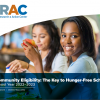

 Shared by Sandra Ware
on May 17, 2023
Shared by Sandra Ware
on May 17, 2023

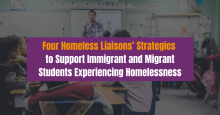
 Shared by Sandra Ware
on Mar 14, 2023
Shared by Sandra Ware
on Mar 14, 2023


 Shared by Sandra Ware
on Mar 2, 2023
Shared by Sandra Ware
on Mar 2, 2023


 Shared by Sandra Ware
on Mar 2, 2023
Shared by Sandra Ware
on Mar 2, 2023


 Shared by Sandra Ware
on Feb 23, 2023
Shared by Sandra Ware
on Feb 23, 2023


 Shared by Sandra Ware
on Feb 21, 2023
Shared by Sandra Ware
on Feb 21, 2023
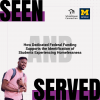
 Shared by Sandra Ware
on Nov 17, 2022
Shared by Sandra Ware
on Nov 17, 2022
 Shared by Karina George
on Jun 29, 2022
Shared by Karina George
on Jun 29, 2022
 Shared by Karina George
on Jun 29, 2022
Shared by Karina George
on Jun 29, 2022
 Shared by Karina George
on Jun 17, 2022
Shared by Karina George
on Jun 17, 2022
 Shared by Karina George
on Jun 17, 2022
Shared by Karina George
on Jun 17, 2022
 Shared by Karina George
on Jun 17, 2022
Shared by Karina George
on Jun 17, 2022
 Shared by Karina George
on Jun 17, 2022
Shared by Karina George
on Jun 17, 2022
 Shared by Karina George
on Jun 17, 2022
Shared by Karina George
on Jun 17, 2022
 Shared by Stephanie Gray
on Apr 18, 2022
Shared by Stephanie Gray
on Apr 18, 2022
 Shared by Stephanie Gray
on Apr 11, 2022
Shared by Stephanie Gray
on Apr 11, 2022
 Shared by Kirsten Greenwell
on Oct 22, 2021
Shared by Kirsten Greenwell
on Oct 22, 2021
 Shared by Jordan Jackson
on Aug 19, 2021
Shared by Jordan Jackson
on Aug 19, 2021
 Shared by Kirsten Greenwell
on Aug 3, 2021
Shared by Kirsten Greenwell
on Aug 3, 2021
 Shared by Kirsten Greenwell
on Jun 30, 2021
Shared by Kirsten Greenwell
on Jun 30, 2021
 Shared by Kirsten Greenwell
on Jun 17, 2021
Shared by Kirsten Greenwell
on Jun 17, 2021
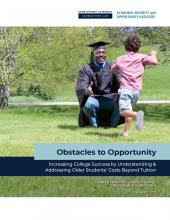
 Shared by Housing Is
on May 20, 2021
Shared by Housing Is
on May 20, 2021
